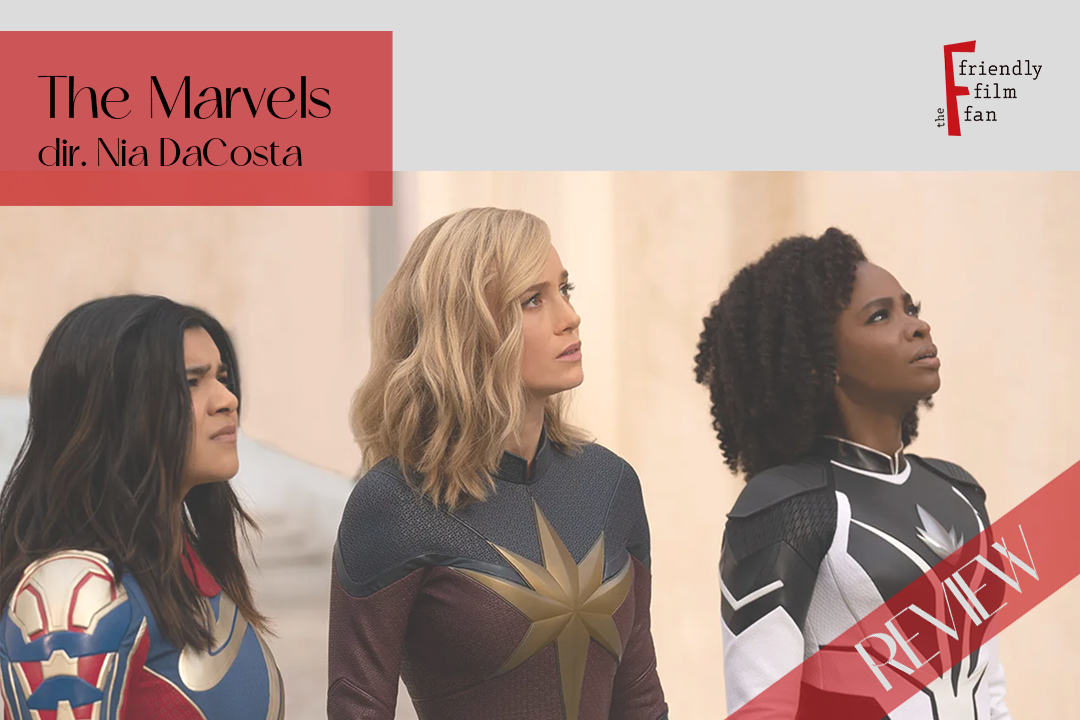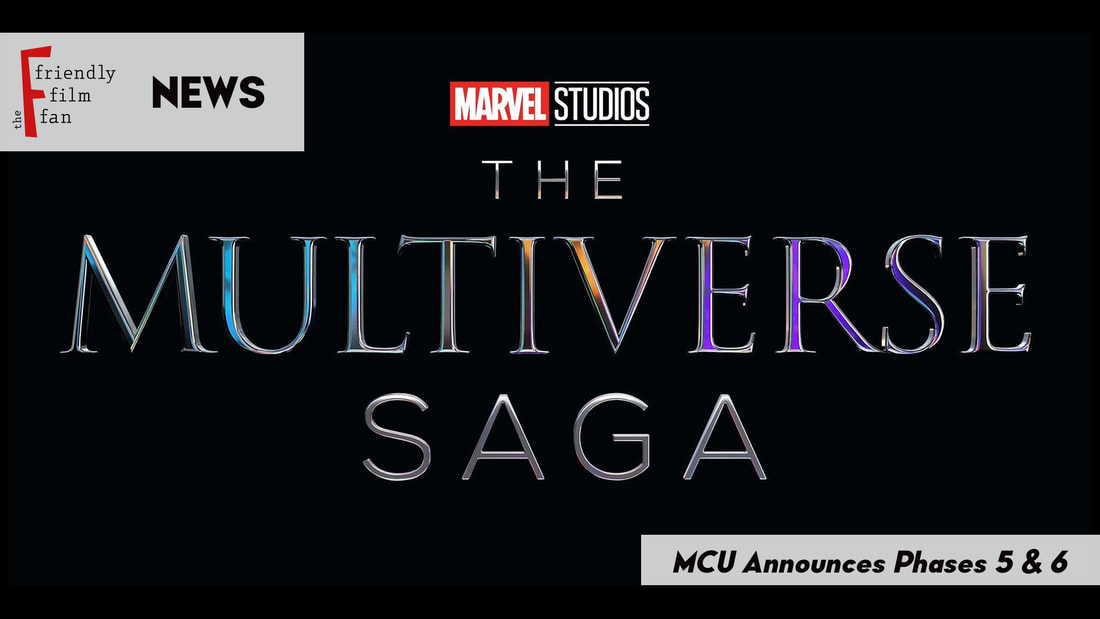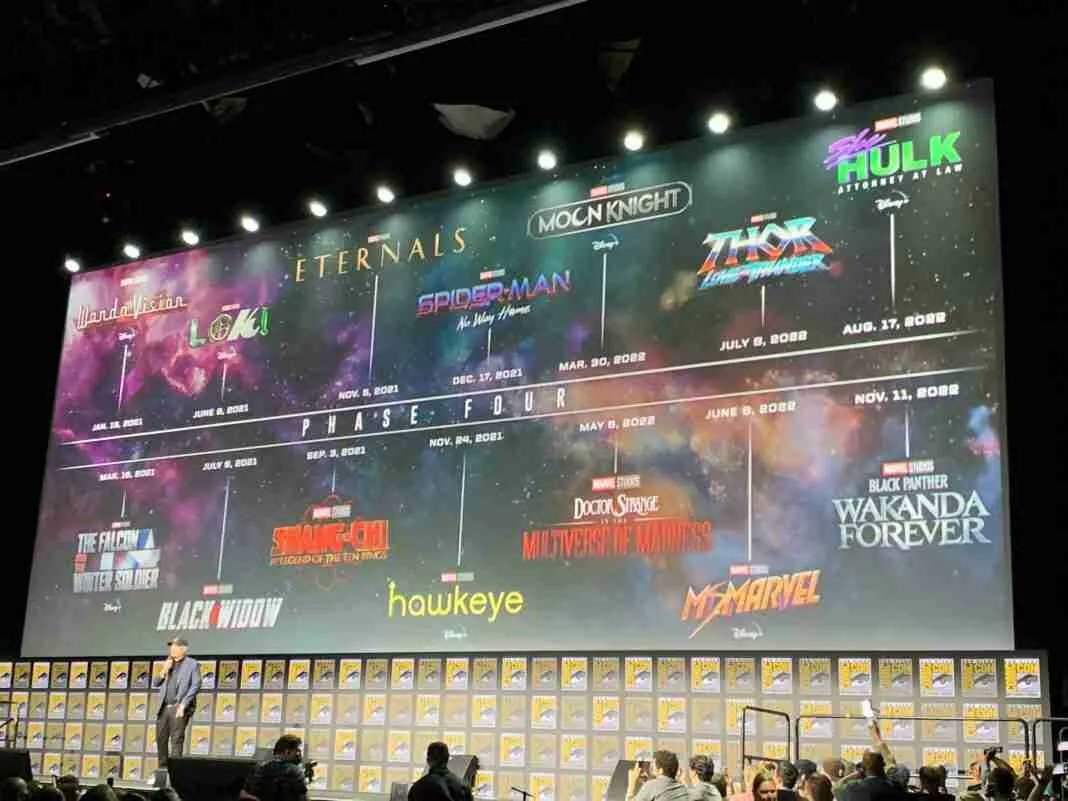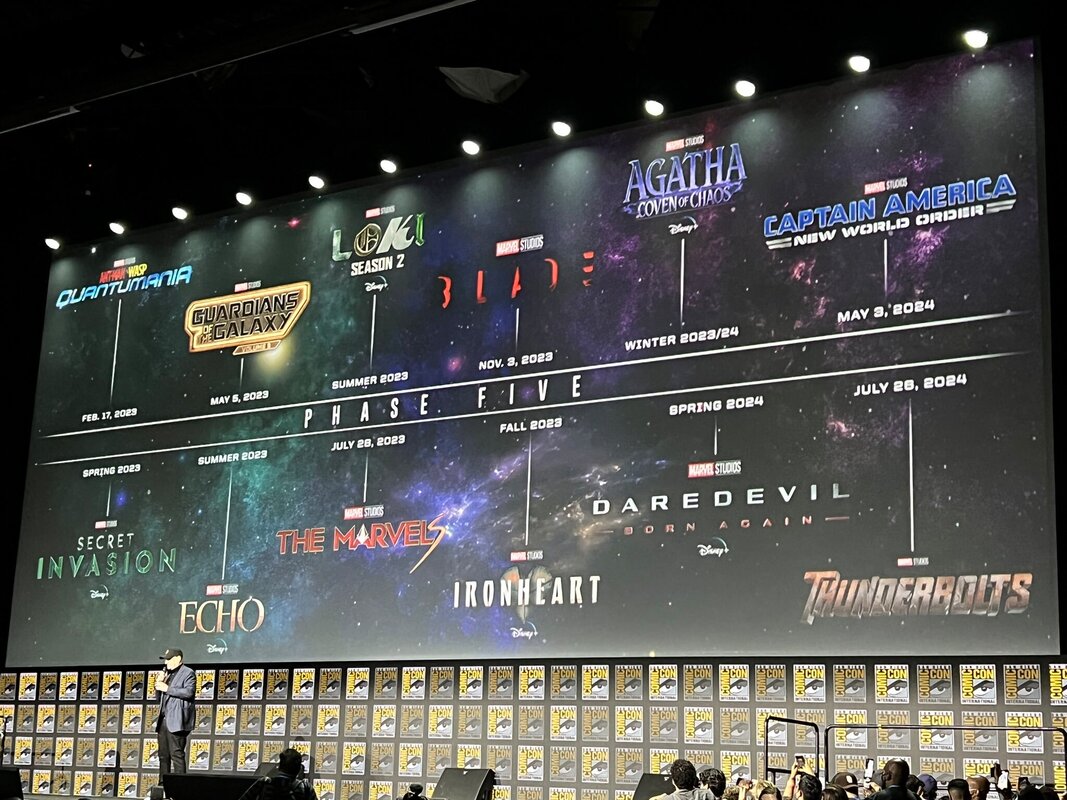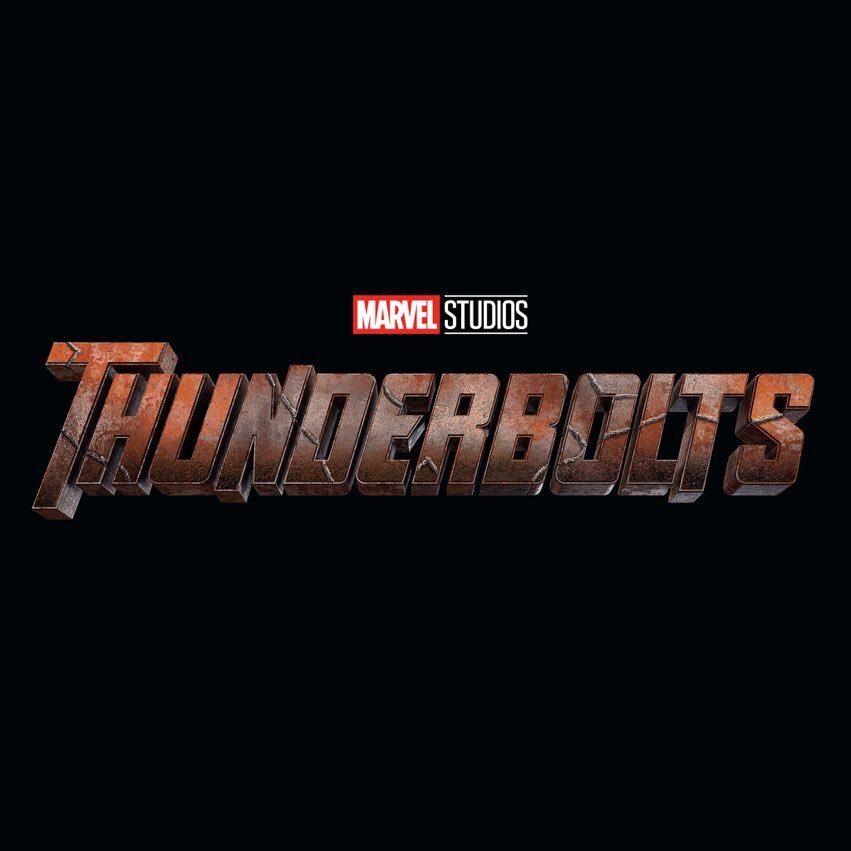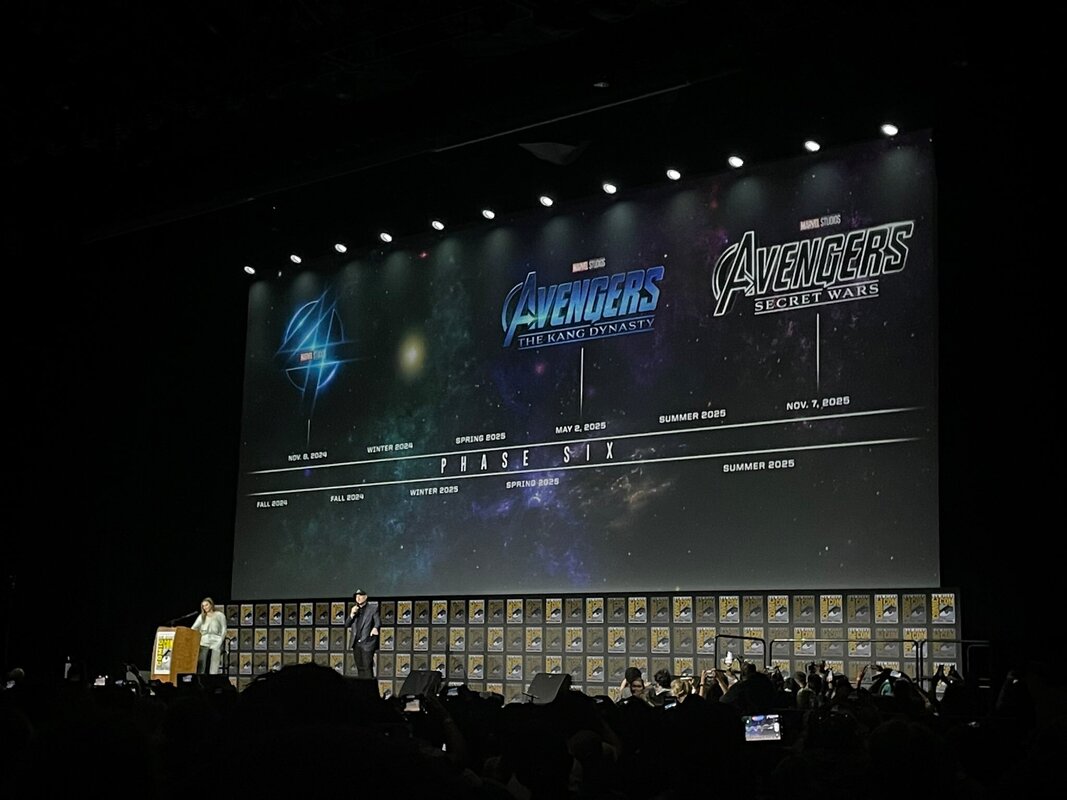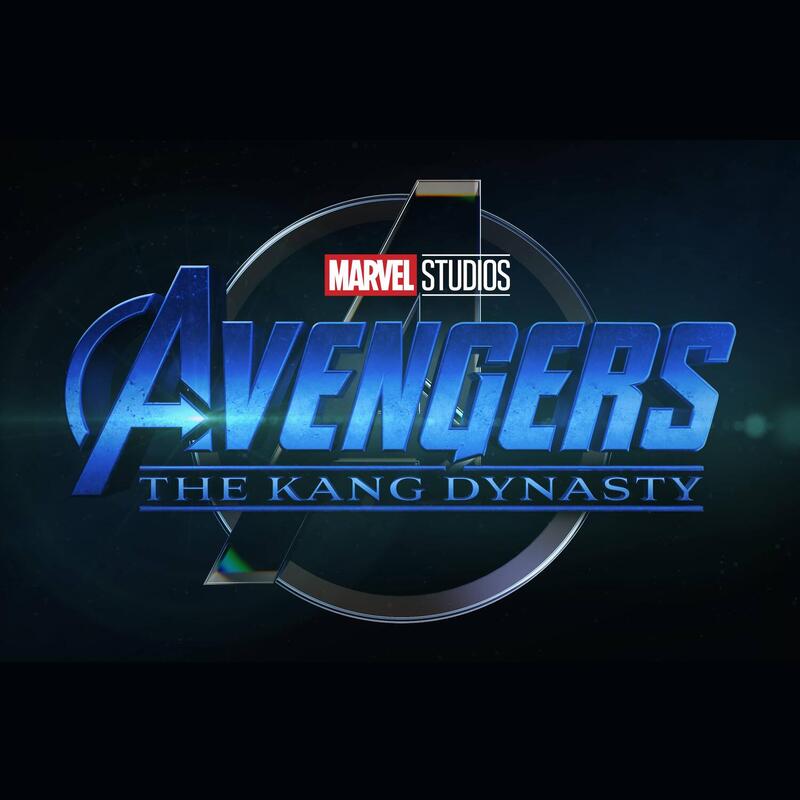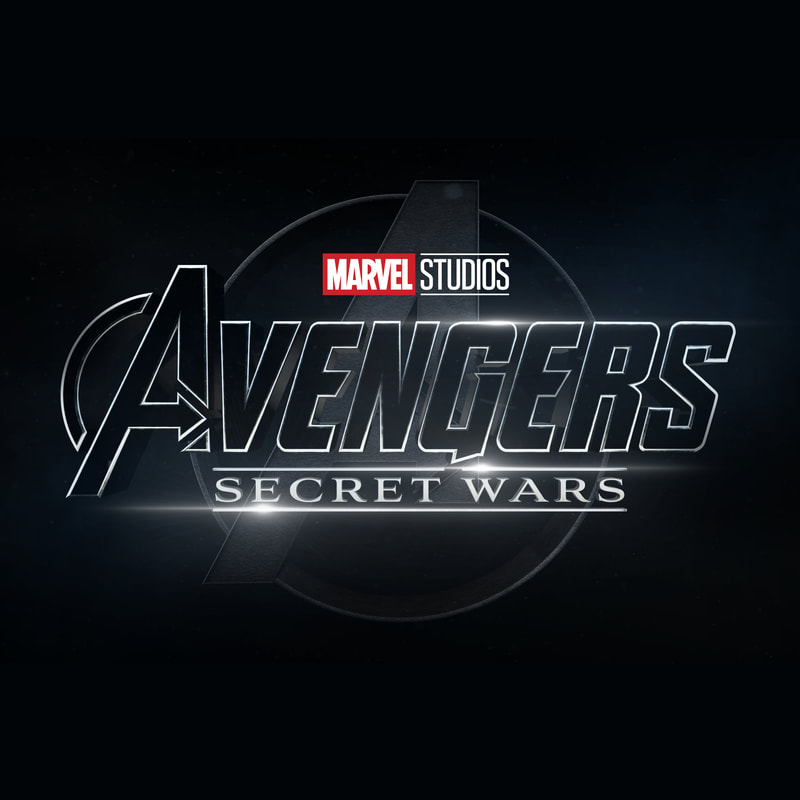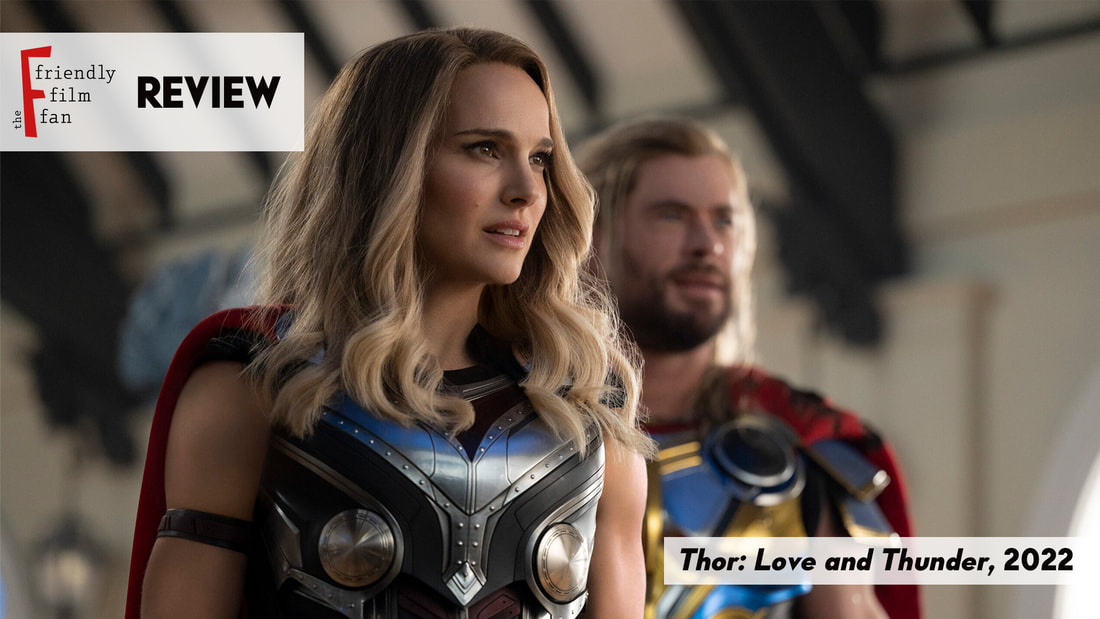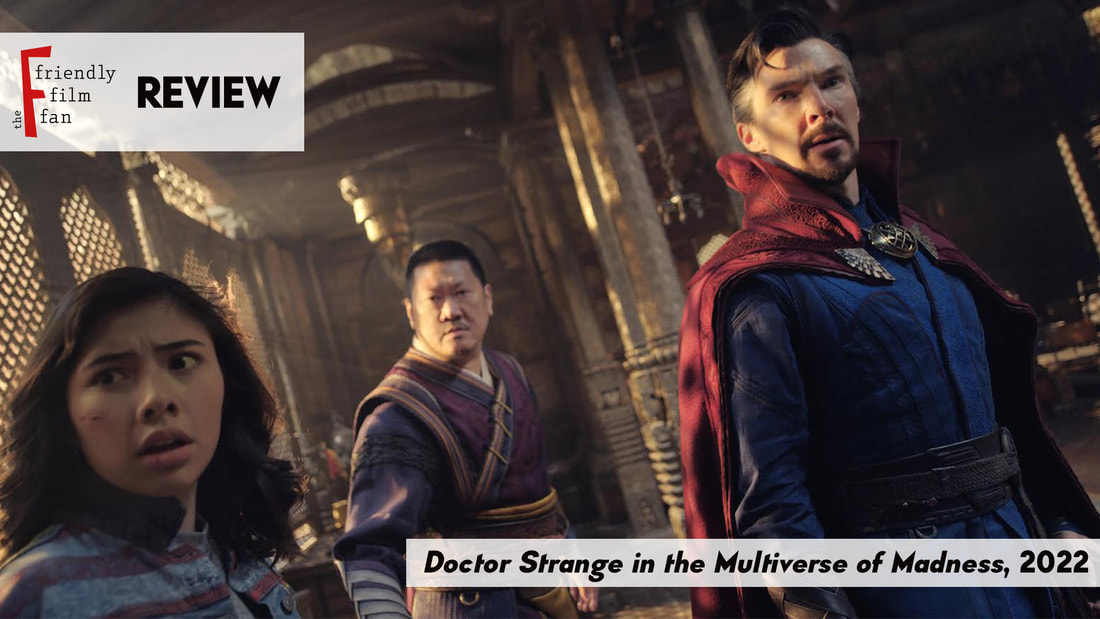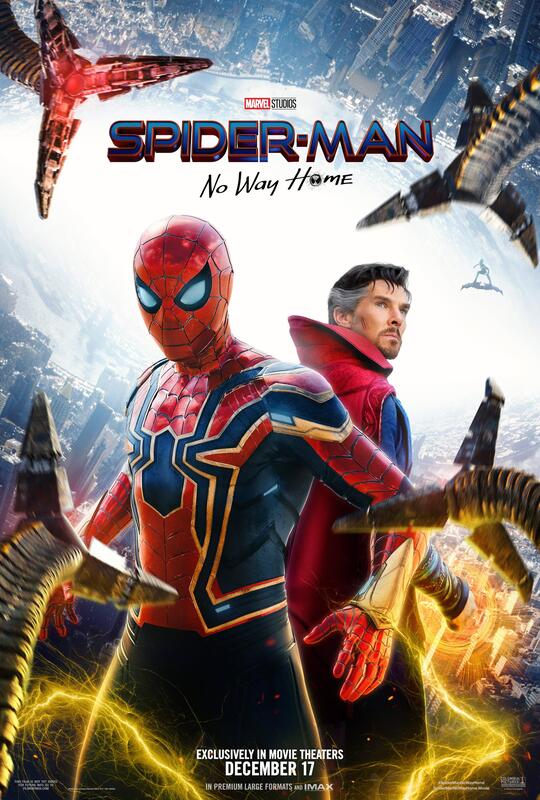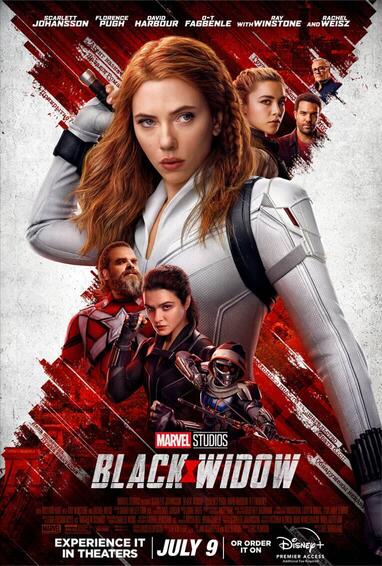|
The Friendly Film Fan Reviews the Latest in Superhero Cinema. The MCU has had a rough go of things lately; while critics’ opinions of the franchise have always ebbed and flowed, its overall reception has waned a considerable amount since the start of Phase 4 (Guardians of the Galaxy: Vol. 3 and a few of its streaming endeavors notwithstanding). Now, The Marvels arrives as the third MCU project to be released this year, and the one by which people are measuring the perceived successes or failures of the franchise as a whole, for some reason. There’s been not insignificant amounts of conversation surrounding its somewhat rocky production history, box office hopes, critic scores, and space in the wider sphere of who should get to write about it, how they should write about it, or why. In short, a lot seems to be riding on this one, mostly unfairly.
For context, it's been over four years since we last saw Carol Danvers (Brie Larson) briefly return to help the Avengers defeat Thanos, many years after she had jetted off to space at the end of her own solo film to deal with the Supreme Intelligence and set things right in the Kree/Skrull war. Since “the snap” was undone, Monica Rambeau (Teyonah Parris) has come back to find her mom has passed on in her absence (she’s also gained superpowers – see WandaVision), and we’ve been introduced to Ms. Marvel (Iman Vellani) in her own solo series. The crux of this film’s plot involves the three of these characters coming together to stop Dar-Benn (Zawe Ashton) – a vengeful Kree with a grudge against Captain Marvel – from targeting various planets across the universe which Carol Danvers had once called home. As if that isn’t enough to deal with, the three are also constantly switching places due to their light-based powers becoming entangled. What works about The Marvels may not be much, but it works well enough to keep the movie afloat for most of its noticeably short runtime. For the most part, there’s an appropriately measured sense of levity here, the three leads well-suited to each other’s energies, even if those energies can’t always match the moment they’re in due to poor writing or editing choices. While Brie Larson and Teyonah Parris are doing what they can without the dialogue to support their performance skills, the standout is unquestionably Iman Vellani as Kamala Khan – a.k.a. Ms. Marvel – whose endearing charisma powers this film through its weaker moments. It’s her that manages to keep the viewer glued to the screen whenever she and the other co-leads are together. There’s also at least one genuinely fun action sequence, right after our protagonists first find themselves switching places. The way the camera moves through this sequence practically in sync with the characters’ movements lends an energy to it that the MCU has been lacking in its last few outings (again, GotG: Vol. 3 notwithstanding). And yes, despite some issues I had with the execution, the mid-credits scene is an actually exciting tease of what’s to come, rather than a block of text or a cheeky joke. Unfortunately, what doesn’t work about The Marvels is a much longer list, even if that list doesn’t quite weigh the film down as much as one might imagine. After a short introduction to Dar-Benn at the film’s start (along with some pretty noticeable green screen), we get going with the main plot pretty much right away, but it’s all cut together in a way that makes it feel choppy or cobbled together from different pieces, rather than feeling like one moment is flowing naturally into the next, which flows into the next, and so on. It doesn’t feel so much like a story is being told as pieces of a concept and plot mechanics are being introduced, and the execution of those introductions doesn’t mesh with the jarring tone-shifts going on in almost every other scene. Even some of the more absurd ideas present in the film are fun in concept, but lack appropriate execution. Whether it’s one sequence involving a lot of cats or another where an entire planet’s language is only song, the film can’t weave them into darker surrounding scenes without it feeling jarring or out of place. There are, of course, other things that don’t work: a lot of the dialogue is pretty bad, much of it is used in place of characters showing who they are (or it comes from the wrong character entirely), the score doesn’t strike a proper balance in more dire scenes, most interpersonal conflict between characters is immediately resolved in the name of moving the plot forward rather than being explored more richly, Dar-Benn is one the MCU’s worst-rendered villains to date, and while some choices regarding the ending make sense, they don’t square with the logic of previous franchise entries or even this film’s own story. Perhaps the biggest offender, though, in this long list of things that don’t work is this pressing question: what is this movie about? The film itself doesn’t seem to have an answer. It briefly addresses the idea of interventionism and how interfering in conflicts that are not one’s own can bring about terrible consequences for those involved, but it almost immediately drops this idea to, once again, keep the plot moving forward. It also flirts with the idea that Carol would continuously try to fix things on her own despite having two people there with her because she feels responsible for the mess in front of her, but it never actually executes on that concept either. Every time the film gets close to having a theme, a message to tie it all together, it abandons the opportunity in favor of keeping the plot moving as quickly as it can, leaving the film feeling fine on the surface, but ultimately hollow. In the end, box office success or lack thereof, The Marvels would likely have a tough time sticking in the minds of moviegoers if it weren’t for the brand recognition and the iconography of its titular characters in other mediums. It’s not as if the film doesn’t work, but what does work seems as though it’s part of a separate story, tonally speaking, and while the chemistry and performances of the three leads are enough to get viewers through most of the runtime, they won’t get through it all without feeling at least a few speed bumps. I’m giving “The Marvels” a 5.8/10 - The Friendly Film Fan
0 Comments
The Friendly Film Fan Breaks Down the Epic Marvel Studios SDCC Panel. This past weekend at San Diego Comic Con – the largest and most popular comic con in the world by far – much was revealed. DC unveiled new looks at their two upcoming end-of-year releases, Black Adam and Shazam! Fury of the Gods (while noticeably avoiding any updated on The Flash, Joker 2, or The Batman 2), Prime Video released a new trailer for their Lord of the Rings prequel series entitled The Rings of Power, and we got a couple of teases for some 2023 releases, including a first trailer for Dungeons and Dragons: Honor Among Thieves and a small teaser for the highly-anticipated Keanu Reeves action vehicle John Wick: Chapter 4. But no studio nor streamer has ever been as busy at SDCC as Marvel Studios. After the official launch of the Marvel Cinematic Universe in 2008 with the releases of Iron Man and The Incredible Hulk, the MCU has dominated Hall H panels and D23 showcases almost every time they’ve happened. Shepherded by longtime Marvel producer Kevin Feige, their biggest and perhaps most memorable slate of reveals was back in 2015, just before the release of Avengers: Age of Ultron. That film’s trailer was played (it had been leaked and then released online a week or so before), and Marvel Studios unveiled their plans for Phase 3, which included the revelation of Civil War as the third Captain America film, the introduction of Black Panther and its principle star, and an eventual culmination in the dual releases of Avengers: Infinity War Part I and Infinity War Part II – the latter would go on to become Avengers: Endgame. (The Spider-Man films were not on the slate at the time of that announcement because the Sony deal had not yet been finalized.) Since that reveal, the MCU has gone through a number of shakeups, including a change of tone for characters like Thor, the passing of one of its most beloved stars in Chadwick Boseman, and of course, a global pandemic which would fundamentally re-alter the release strategy for Phase 4, the original plans for which looked very different from what they eventually became. To that end, before we dive into where the MCU is going, it may be helpful to take a look back at where it has been post-Infinity Saga, which ended with the Phase 3 closer, Spider-Man: Far From Home. I won’t dive into each release individually, but will list them here for those who need a little refresher. All series are marked, and anything not marked as series is a feature film. (Note that the What If…? animated series is not officially part of the MCU, but is produced by Marvel Studios as part of their release slate.) PHRASE 4 SO FAR (RELEASE ORDER)
The only real mystery left with this previous release slate is that of Moon Knight, which was initially marketed as a limited series, but seems to have been left open for at least the possibility of a season 2 if Marvel Studios wanted to go for it, given its post-credits scene in the final episode, and several Phase 6 release date not yet having been revealed. Presumably, one of those could be a placeholder for a Moon Knight season 2, but as only three Phase 6 projects were revealed at SDCC, that confirmation or lack thereof won’t be coming for a while. With Thor: Love and Thunder in theaters right now, Phase 4 of the MCU is nearly wrapped up, with only four more projects on the way, two of which act as their own stand-alone adventures. PHASE 4 ONWARD (RELEASE ORDER) Though no official release date has been set for the Guardians of the Galaxy Holiday Special, it is still slated for a December release this year. The I Am Groot show, which also seems largely disconnected from the wider MCU (and wasn’t on the Phase 4 recap slate, much like the What If…? show) has been dated for an August 10 release. As far as integrated MCU projects, however, there were some significant updates. Marvel’s She-Hulk: Attorney at Law series on Disney+ released a new trailer with a more detailed look at the world of superhero law, more of Mark Ruffalo’s Hulk spending time with the titular character, and a tease at Daredevil (played by Charlie Cox) making a guest appearance after his MCU debut in Spider-Man: No Way Home. In a less formal reveal, the whole of Phases 4-6 was also officially dubbed to be what Marvel Studios calls The Multiverse Saga. The biggest update, however, was one for which every MCU fan was supremely nervous: the first trailer for Black Panther: Wakanda Forever. Following the tragic passing of Chadwick Boseman as the titular character, also known as King T’Challa, it has been an unsolvable mystery how the MCU was going to reckon with the course of real-world events in a film series where the character of T’Challa had not passed away, in fact having made a triumphant return to the land of the living in Avengers: Endgame. After the news was released during the Phase 4 reveal that Marvel Studios would not be recasting the part, many speculated as to who would take up the mantle (Shuri, Nakia, and Okoye are the leading theories), and whether Ryan Coogler and Marvel would be able to pull off a second Black Panther film that simultaneously needed to push the MCU forward in telling a Namor/Atlantis-infused story and write out its leading character with enough tact and grace that it wouldn’t feel awkward or forced for the characters within that world (a challenge which even Star Wars couldn’t quite conquer). Luckily, the new teaser does make it seem as if they actually pulled it off, with a somber but inspiring tone of bittersweet triumph, emotional farewells, and national strength for the kingdom of Wakanda. The film itself is slated for release on November 11 of this year and will act as the final project in Phase 4 of the Marvel Cinematic Universe. Both the She-Hulk: Attorney at Law and Black Panther: Wakanda Forever trailers, as well as the rest of the Phase 4 release slate, can be seen below.
PHASE 5 But while the Black Panther trailer was perhaps the biggest unveiling at SDCC this weekend as far as non-announcements go, it was not the only major revelation that Feige and Marvel Studios had to offer. There was also a closer look at Phases 5 & 6 of the Marvel Cinematic Universe, with some projects receiving official release dates and names, and others receiving major updates as far as release timing and progress. We’ll get to Phase 6 in a bit, but for now, let’s go over what’s been revealed about Phase 5. Those revelations included estimated dates for MCU series Echo, Loki: Season 2 (which is currently filming), Agatha: Coven of Chaos, Ironheart, and an 18-episode series order for Daredevil: Born Again, which will star Charlie Cox as the titular character and Vincent D’Onofrio as Wilson Fisk, a.k.a. Kingpin (Fisk was last seen in Marvel’s Hawkeye series). It is not known which of these shows – save for Loki – will be limited series or recurring projects. Also revealed were official release dates for films such as Ant-Man and the Wasp: Quantumania, Guardians of the Galaxy: Vol. 3, The Marvels (which acts as the sequel to Captain Marvel and the Ms. Marvel series simultaneously), and Blade, plus the official reveals of Captain America 4 (which is called New World Order and will star Anthony Mackie as Captain America following The Falcon and the Winter Soldier series) and a Thunderbolts movie. All release dates, estimated and exact, are listed below. (*There has also been a What If…? season 2 announcement set for early 2023, but no season-of-year estimation or release date has yet been made public.) PHASE 6 PREVIEW Phase 6 is shrouded in shadow and secrecy, but not all things have been left mysterious. While many of the late 2024 and most 2025 release dates have been kept ambiguous as far as what projects will place where, it’s likely that many of the as-yet-undated projects will fill those spots. Projects such as the in-development and confirmed-to-be-R-rated Deadpool 3 from Shawn Levy will likely factor in here, as will (most likely) Marvel’s Armor Wars and supposedly R-rated Zombies series for Disney+. And of course, don’t be surprised to see some X-Men projects announced for this phase later on once Phase 5 is well underway, especially given some of the stories that are due to come later. On the end of certainty, however, Marvel’s previously announced Fantastic Four movie has been selected for release on November 8, 2024. There are no details yet insofar as casting or a replacement for Jon Watts, who was picked to helm the project but left the job earlier this year, citing the need to take a break from superhero filmmaking after rounding out his own Spider-Man trilogy with No Way Home in late 2021. There was, however, another pair of announcements to make up for that lack of news which MCU fans the world over have been eagerly anticipating. If you’re like me or a number of other MCU fans, Phase 4 has likely felt a little bit aimless to you; that’s not to say it doesn’t have a larger point or won’t fit in with the longform story it’s leading into, only that an end goal has been elusive across most of its run; there isn’t really a culmination project like The Avengers to wrap it all up and lead to the next phase, even as Black Panther: Wakanda Forever seeks to close the chapter. Phase 5 will culminate with the Thunderbolts movie, which seems like a logical endpoint for both phases, but fans have nonetheless wondered: will an Avengers movie ever happen again, and if so, when? Well, now we have an answer, and it’s a doozy. It seems that in 2025, we’re scheduled to get not one, but two Avengers films, separated by a matter of months and only two other as-yet-unannounced MCU projects. The two films are entitled Avengers: The Kang Dynasty (slated for release on May 2, 2025) and the big reveal, Avengers: Secret Wars, which is dated for November 7, 2025. The former of these two titles will likely deal with the Marvel villain Kang the Conqueror - played by Jonathan Majors – who will appear in Ant-Man 3 and an approximation of which was already revealed in the season one finale of Loki on Disney+. The latter, titled after the beloved Secret Wars Marvel comics run, will supposedly feature the collapse of the multiverse as the MCU universe (616) collides with another, eventually causing the demise of both. These events have been teased in other MCU projects but were seemingly actually triggered in Doctor Strange in the Multiverse of Madness by an incursion caused by its title character (the mid-credits scene of that film addresses this). In theory, Secret Wars could provide Marvel Studios with the opportunity to reboot the whole of the MCU completely, allowing them to start from scratch in a way that feels like both like a finale for the current MCU and an organic start to a new version of it; in effect, it would be a true finale to the whole enterprise. Either way, only one thing is certain: Marcel the Shell had better make an appearance, toenail skis and all.
UNDATED MCU PROJECTS (ANNOUNCED)
Which of these newly-announced/newly-dated MCU projects are you most looking forward to? What did you think of the trailers for She-Hulk and Black Panther: Wakanda Forever? Let us know in the comments section below, and thanks for reading! - The Friendly Film Fan The Friendly Film Fan Discusses the Latest from the Marvel Cinematic Universe. After Marvel Studios rolled out Thor: Ragnarok in November of 2017, courtesy of director Taika Waititi (Hunt for the Wilderpeople, What We Do in the Shadows), the entire landscape surrounding the character changed, seemingly overnight. Gone was the self-serious, dour god with his grandiose Shakespearean aura and booming voice, and gone was the dramatic emphasis on world-ending stakes (at least in Thor’s own movies). Also gone was Jane Foster, Thor’s love interest in the first two of his solo films, and the driving force behind the plot of the second. With a striking tonal shift and Natalie Portman refusing to come back for the third film due to its fallout with original Dark World helmer Patty Jenkins, Ragnarok felt like a reset, a fresh-faced new start for both the character of Thor and for the way in which the MCU would handle most solo films going forward, at least if they weren’t already in production. Even with the success of the Guardians of the Galaxy films – which thrived on their absurdity and James Gunn’s comic sensibilities – no one knew if people would buy into a character whose entire mode of being was revamped just before he showed up for the grand finale of the whole Infinity Saga with everyone else. For any other character in the MCU, the switch would have come way too late. And yet, the gamble paid off. Not only was Ragnarok a bigger hit than the first two Thor films, it was a major hit on the critical scale, its highest praises being Chris Hemsworth’s comic timing and Taika Waititi’s heartfelt storytelling. It came the closest of any solo film apart from Captain America: Civil War to grossing $1 billion at the domestic box office (Black Panther would shatter that record only three months later). Naturally, Marvel Studios wanted Waititi back for another go-round, but unfortunately, Love and Thunder isn’t nearly as successful in its storytelling (and is likely to be less successful in its box office) as its predecessor was.
To be sure, there is a lot to like about Love and Thunder, from its design work to most of the performances. Chris Hemsworth is so much Thor now that seeing him outside of the MCU feels alien, as if those are his alternate personas whereas Thor is his real one, and it works here just as well as it always has, with great comic timing per usual. Christian Bale - easily the best part of the movie – is gripping as Gorr the God Butcherer, wringing a genuinely terrifying, nuanced performance out of a character whose screen time essentially amounts to threats of action but little else. And of course, as heavily advertised, there is the return of one Doctor Jane Foster (Natalie Portman) to the franchise. Portman is definitely having a lot of fun here, and you can feel it coming through the screen (though her character’s story leaves a bit to be desired, which will be discussed in the spoiler review I may or may not forget to write). Who wouldn’t love wielding Mjolnir with biceps like those and summoning lightning from the heavens? Essentially, almost everything that worked last time – good performances, cool villain, fun side characters, uniquely styled production, solid classic rock-heavy soundtrack – works again. Even some of the jokes land in unexpected ways. But that’s not enough to carry a movie that doesn’t seem to know what it wants to be or what story it wants to tell. As a matter of fact, it seems like it doesn’t know whose story it wants to tell. As Korg narrates (which happens multiple times), we’re taken through the storylines of a few different characters, and while I won’t spoil much more than that here, a lot of time is spent with each before we have to go back to do the whole thing again with whoever’s next in line. This causes the film to feel messy, unfocused, and improperly paced. If anything, Love and Thunder isn’t quite long enough to give the necessary space to everything it wants to do. The adventure this time around has almost nothing to do with helping the characters resolve any inner conflicts – as all the best stories do – and that adventure occupies most of the runtime without ever truly coming together with what the characters are going through except by proxy or when it’s unavoidable. This is where the issue arises wherein the film doesn’t seem to know what story it’s telling, or whose. Plot-wise, this one is already pretty thin, so any time devoted to non-plot-essential stuff has to focus on emphasizing whatever themes the movie has through its characters’ actions. The first Thor was about humility being the key ingredient in leadership, knowing that one cannot lead without first humbling themselves. Ragnarok was about a civilizations demise in the wake of their own genocidal past not only being justified but righteous and that any true nation is made up of the people within it rather than the ground they stand on (it really is a subtly deep movie). In fact, The Dark World is the least liked Thor film largely due to the fact that it’s not actually about much other than setting up what’s to come (that and its first half is genuinely boring). Love and Thunder – though it’s not setting up anything in particular – has the same problem. There doesn’t seem to be a unifying theme or message here. What is this movie about? The question isn’t “what happens in the plot?” or “what beats does the movie hit before moving on to the next?” or even “what do the characters have to do to advance the story,” but what is this movie about? Having seen it a few days ago, I still don’t really have an answer. The film doesn’t really have an identity of its own, only one similar to its predecessor and nostalgic for its franchise beginnings. And as far as whose story this is, that sort of thing would typically arise from whose internal conflict the movie is attempting to resolve. Some would say Thor’s, but there’s not a lot of emphasis on his “figuring out who he really is,” as the marketing told us, since the conflict with Gorr takes up most of that space and doesn’t really explore that aspect of Thor’s character at all. Others may say Jane’s or even Gorr’s, but Jane doesn’t really have an internal struggle to speak of, and while Gorr does have both internal and external conflicts, they don’t really match up with each other very well. As far as character, Love and Thunder also skews fairly close to the bones of what it needs for any interactions between them, and apart from Thor and perhaps Valkyrie, hardly any of them are given anything interesting to do. To justify bringing Jane Foster back into the fold so she can become “The Mighty Thor,” the film doesn’t really give more than a half-assed answer, and the rest of the time, she doesn’t really drive the plot forward at all. It’s as if she’s “along for the ride” but never actually gets to drive. Gorr, too, is also given almost nothing to do for most of the film, which testifies to Christian Bale being one hell of an actor, since his performance remains the best part of the movie. Even Korg and Valkyrie don’t really do a whole lot. As I’ve noted before, though, these are larger issues kept beneath a shiny surface, and that surface does look pretty nice on the whole. All in all, the MCU’s latest entrant is a fun summer romp, tailor-made for a casual Sunday afternoon viewing, but doesn’t have much else going for it beneath the surface. Unfocused, oddly paced, and thinly plotted, its best moments can’t suffice for the fact that it doesn’t really seem to have much substance beneath its candy-coated exterior, or anything it wants to say. Even Doctor Strange 2 at least had Sam Raimi’s whacky filmmaking to keep it interesting, but this one doesn’t really make a lot of interesting choices in that vein, at least not choices that haven’t been proven to work before. It mostly succeeds on its own terms, and it’s hardly the most aimless thing or one of the worst efforts that Marvel Studios has produced thus far, but Thor: Love and Thunder will likely rank pretty low when paired with the whole of what the MCU has to offer. I’m giving “Thor: Love and Thunder” a 6.5/10 - The Friendly Film Fan This review briefly touches on some of the plot setup for this film. You have been warned. The MCU has always been a little bit self-serious. Even in the films where comedy was the primary mode of storytelling (i.e. the Guardians and Spider-Man films), one has a distinct sense that though the material is self-aware, it’s not especially zany or eager to become playful with its subject matter, particularly on the crafts side. There are no star wipes, no cuts-to-black in the middle of proceedings, and zero freeze-frame lining the walls of the most popular and easily the most successful franchise – both critically and commercially – ever committed to digital rendering. There aren’t even any transitions where one frame bleeds into another as if characters are invading the narrative to take over its main thrust. Most of it, to be frank, is fairly straightforward comic-book storytelling, as straightforward as those things can be when dealing with a purple genocidal alien and a pair of best friends who take the forms of a tree and a raccoon. Generally speaking - and apart from the Guardians films – there’s not normally a ton of risk involved in directing a Marvel Studios film, at least not in terms of an audience being jarred by one’s sense of style; that can get boring after a fashion. In all truth, the MCU needed to get a little silly to stay fresh. It needed to evolve from a mere action/comedy franchise into something more akin to a fun exploration of what kinds of MCU stories can be told. And that, by far, is the biggest strength director Sam Raimi offers in directing the newest entry to the Disney juggernaut, Doctor Strange in the Multiverse of Madness.
As the titular sorcerer travels the multiverse with the help of newly-introduced multiverse-hopper America Chavez (Xochitl Gomez) in order to stop a fearsome evil from pursuing them and ultimately taking America’s power for its own, one can sense the Sam Raimi style bleeding into the frames from the edge until they consume the story entirely. There are multiple action sequences with genuinely silly effects – one in particular involving a classical music composition – and any number of transitions those unfamiliar with Raimi will no doubt notice as being distinct amongst the wider MCU. Raimi’s been no stranger to camp, ever since his original Evil Dead release in 1981, and it peppers Multiverse of Madness in some fairly significant ways. Another storytelling element to which Raimi is no stranger is horror; Multiverse of Madness is not a full-on horror film, but it does get significantly closer to that genre than any MCU movie has to date, though just how close Raimi was allowed to get is in question since Scott Derickson, the film’s original helmer, presumably left the project because Marvel didn’t want him to get too close to making an actual horror film. That said, certain images and moments are crafted with a horror element in mind, as is evident in certain sequences and with particular characters, especially the villains this time around. Where the film runs into significant problems is its script, one that can’t seem to decide whose story it’s telling or how it wants to go about telling it. Whereas the initial Doctor Strange film had the benefit of being an origin story, thus only needing to set up one character, Multiverse of Madness carries the unwieldy task of not only introducing us to America Chavez, but to the multiverse at large, and all that it contains, both in its more brief appearances and its more significant layovers. That means a lot of characters and a lot of worlds to cover in a fairly short span of time, and it’s not always up to the task. Unfortunately, though the film certainly has at least a small arc for its titular hero, and he is very much in the center of the frame, the introduction of the wider MCU means that stories in which he’s involved can’t only focus on him now – even if he is, as noted, the title character. Because of all the setup involved, as well as needing to handle at least two other mainline characters’ stories, Strange feels a little bit pushed to the background in terms of development here. We know about him by film’s end almost as much as we knew at the beginning, and apart from some rudimentary introductory material, we don’t really know that much about what kind of person America Chavez is either. That said, MCU movies have bounced back from character development issues and over-bloat before – hell, even Iron Man 2 – the worst MCU movie – still coasts on the charms of Downey Jr. and Scarlett Johannson. What Multiverse of Madness may not bounce back from is in how it handles the Wanda Maximoff character, whose MCU journey has been one of the most compelling of any of her cohorts across four movies and her own Disney+ limited series (though the number of movies drops to three if one considers she only briefly appears in Avengers: Endgame). It’s not to say that the place Wanda ultimately ends up in the film makes no sense, but on the whole, it’s merely a repeat of her emotionally-driven arc from WandaVision without the necessary developments taking place to get her back to where she needs to be at the beginning of it (I’m deeply sorry if that sentence is confusing, but keeping this spoiler-free means that will occasionally happen). There is one small line during the first act that hints at what might be driving Wanda towards this point of origin, but no justification for it or demonstration of its truth beyond what we already know from that series. Elizabeth Olsen, as always, acts the hell out of whatever she’s given to do, but her function in this film is more so as a plot device than as her own distinct character, ditto America Chavez for most of the film’s runtime. Wanda begins at an endpoint here without the MCU having earned that journey for her character, and while her story in this film may make sense in a vacuum, the question of how everything connects to the wider MCU forces it to confront a near-antithesis of itself without so much as a guide to who she is or who she has been. All in all, Doctor Strange in the Multiverse of Madness does bring some of that much-needed fun back to the film side of the MCU, where nearly everything has been soaked in dour, post-Endgame dread or multiverse acknowledgement/setup, and is able to bring some of that Sam Raimi zaniness to this world with a decent amount of success, but the script for the film can’t seem to handle the weight of what it needs to accomplish in the amount of time it has to accomplish it. Everything that doesn’t work takes up a lot of the spotlight from the things that do, and despite the myriad showcases of style, some fun cameos, and a healthy dose of zany horror, this MCU entrant may end up disappointing audiences on a number of levels. Perhaps this film needed to be longer in order to accommodate everything it needed to include and flesh out some of its more significant pacing issues, but – while I won’t say I wasn’t at least a little bit let down by some of its less favorable material – for my part, it is refreshing to see the MCU dive head-first into becoming something almost entirely different than what it’s been to this point. I’m giving “Doctor Strange in the Multiverse of Madness” a 7.6/10. - The Friendly Film Fan “It’s not what a movie is about. It’s how it is about it.” So quoted the legendary Roger Ebert, a mantra which he often attributed to his longtime friend and fellow film critic Gene Siskel. The quote is straightforward enough – what’s in a movie doesn’t matter so much to its overall quality as how the material or “content” it includes helps to tell the story. The better the story, the less added dressing is needed to keep it afloat, and no matter how much fan service or surface-level enjoyment, a story badly told will always be a bad story. Such is the attitude I took (and, I believe, that everyone should take) going into my first viewing of Spider-Man: No Way Home, the 27th film in the Marvel Cinematic Universe, the third produced by Sony and Pascal Pictures, and the MCU’s first multi-versal story outside of the incredibly successful Disney+ series Loki.
The film is quite good, and puts the MCU back on track in a big way after Eternals failed to connect the way it was probably meant to, although audiences seemed not to mind how strange and different that turned out to be. No Way Home, by contrast, seems destined to have folks clamoring to show others its inevitably high Rotten Tomatoes score as proof that it’s “the best Spider-Man movie ever,” but it seems too often that the ambition of its scope keeps getting in the story’s way. (Also, that’s not how Rotten Tomatoes works, but that’s a whole other piece.) To put it another way, I’ve already seen many sing its praises as perfect or near-perfect not because of how the story is told, but because of what is or isn’t in it. In some cases, it seems people had already decided how they would feel about the movie before it came out – amazing if it delivered the fan service they wanted, or a disappointment if it didn’t. But I’m not here only to deliberate on the meritocracy of storytelling vs. fan expectations. Without spoiling anything, what works most about the movie is the immense heart it wears on its sleeve and its intense commitment to telling this story at a grand scale. No, this isn’t a scale at the level of Dune or even the most epic of Spider-Man films in terms of pure scope, but its ambition is so monstrous, one wonders how the film never collapses under all that weight – of expectations, of story pursuits, of everything it’s carrying. It stumbles a few times, to be sure, and there are certainly moments where the heart of it is sacrificed for the sake of another MCU-style joke (you know the kind), but when it really swings for the emotions, it somehow manages to squeeze them out of you, regardless of whether you know you’re being emotionally manipulated or not. The performances are all swell as well, though I could have done with some of Alfred Molina’s Spider-Man 2 uber-sincerity sneaking its way into the Doc Ock character here; he’s good in the film, but the writing for him is too snarky, whereas the character in the original films was more ponderous with his dialogue. On the other hand, there is quite a bit that holds the movie back from being a truly great MCU movie, even if it’s already solidified itself as one of the better Spider-Man outings. For starters, its ambition forces the story to stretch itself a bit thin, and while the fan service in the movie mostly works, it doesn’t have much of a purpose in contributing to this story apart from serving as distraction when the story can’t quite figure out what to do with itself. As for how it doesn’t contribute much under its surface, it’s difficult to say without spoiling some plot elements, so I’ll save that for the Spoiler Review in a few days. Another thing that doesn’t quite work are some story threads being picked up and then dropped as if they were never addressed; whether these threads appear for the sake of a joke or a cool dramatic moment depends on which thread one pulls, but a few of them are simply never brough up again, no matter how much sense it would have made to do so. This plays into what I mentioned earlier – undercutting heart with humor. It’s clear that Jon Watts and company love everything this character can do, and what he chooses to do, but occasionally it seems as if they’re not really sure who he is as a person, what drives him the most. There are sequences where he needs to make a tough decision, but others end up deciding for him, rather than him finding the solution himself. So often moments that could easily be the small, heartfelt ones are traded for jokes or fan service or for action beats (even if they’re really good action beats) enough that the moments of genuine emotion the audience is supposed to feel – even the ones they should feel the most – feel like afterthoughts to the film’s larger concerns of pleasing as many viewers as humanly possible. And now it’s time to get to the thing that’s been my biggest issue with all three MCU Spidey movies, but I haven’t really addressed yet in any meaningful way: Spider-Man, the character, has had almost no tangible relationship to New York City for 3 MCU movies now. That’s not to say he doesn’t interact with New York at all (he does a little at the beginning of Homecoming), but the vibrant location so central to both the idea and mythos of Spider-Man is barely given any screen-time in Jon Watts’ films. It’s there, but it’s a background, an afterthought, a way for us to know where the movie is happening, but not why. NYC doesn’t really have any bearing on where the story goes or the decisions any characters make. Sam Raimi’s on-screen iterations of Spider-Man were thoroughly a part of NYC, and constantly engaged with the people in it. Even The Amazing Spider-Man has that fantastic crane sequence. NYC is just as much a part of Spider-Man as the suit itself or the powers, and relegating it to what is essentially a CGI treadmill just to get the title character from one place to another while doing “more important” things feels like a huge missed opportunity for this “Home” trilogy. Perhaps with a tighter script and more sincerity, No Way Home could have been the best Spider-Man movie ever made, but the MCU and multi-verse of it all keep getting in the way of letting that happen, for one reason or another. It’s still a very good movie, don’t get me wrong, and I’ll have a lot more positive things to say when I can actually talk about why I liked them in greater detail in the spoiler review, but for now, that’s all I can really say. I certainly don’t begrudge people who genuinely love this and I wouldn’t dream of telling anyone not to go see it in theaters – lord knows those places could use the help right now – but I would encourage people to look past what’s in the movie, and instead judge it on how its contents are employed. You might find that the film even gets richer for it. I’m giving “Spider-Man: No Way Home” a 7.8/10. - The Friendly Film Fan Black Widow is the 24th film in the Marvel Cinematic Universe, and the first to release in theaters in almost two years. It is set just after the events of 2016’s Captain America: Civil War and follows the titular character, a.k.a. Natasha Romanov (Scarlett Johannson), as she goes on the run from the U.S. government following her violation of the Sokovia Accords and direct assault on the Black Panther (if you recall, this was during the airport fight, when she helped Steve and Bucky flee). Needless to say, things have gotten complicated, as the former Soviet assassin turned defector to the United States now has no country to call home, and no family to return to…or so she thought. As it turns out, Natasha’s former surrogate sister Yelena (Florence Pugh) is attempting to contact her in order to ask for her help freeing the other Widows from the Red Room – the mysterious location of Natasha and Yelena’s original indoctrination – and the control of the man behind it, who is thought to be long dead. With limited resources and strained relationships to the only ones who can help her, Natasha must confront the darkness of her past, and once and for all put an end to the very organization that made her what she is. This film also stars David Harbour, Rachel Weisz, O-T Fagbenle, Ray Winstone, and William Hurt.
The history of Black Widow’s release is complicated, to say the least. Due to the overwhelmingly fast advance of the infamous COVID-19 pandemic in early 2020 across the globe, and after a worldwide movie theater shutdown, the film was postponed to November, where it remained on the release schedule for some time. Then, a while later, once it was realized that this worldwide nightmare would actually last quite a lot longer than it ever needed to (and those averse to basic vaccine logic and common sense science certainly weren’t gonna help speed things up), the film was once again delayed to May of 2021. And then, due to some inevitable release calendar shuffling and an eagerness to just get the film in front of eyeballs, the final release was set for yesterday, July 9, with the added bonus of a Disney+ Premier Access release. From the time of original release date to the eventual one, Disney+ has launched no less than three brand-new MCU shows, two of which have now concluded (and one whose finale is in less than a week). The middle of those shows – The Falcon and the Winter Soldier – was meant to be the first one out of the gate, and was supposed to have come out before this film, so naturally, there’s a lot of re-contextualization that needed to be done, and the spotlight on Marvel Studios has never been larger. So, after fans clamored for a solo feature for so long, was Black Widow, the first MCU film in almost two years (and the single movie most likely to get people back into the habit of theatrical moviegoing), worth the wait? Well…sort of. In its purest sense, the primary reason this movie was worth all the waiting was just getting to see an big-budget MCU movie on the big screen again. My showing was packed with eager fans ready to come back to the movies for the series they know and love, and that’s a really underrated aspect of watching these things theatrically – the sense of community one feels with everyone else around them experiencing this event. Unfortunately, the film can’t help but feel like a placeholder due to both its setting and some story elements that felt woefully underwritten for only the MCU’s second female-led superhero outing, especially one concerning a character fans have been clamoring for a solo movie from since Iron Man 2 in 2010. Don’t get me wrong, as a movie, Black Widow definitely works just about as well as most other mid-level entries in the unstoppable force that is the Marvel machine: the action is pretty decent, the performances are all really solid and get the job done, it moves at a solid clip so you’re never bored, and the central mystery at the heart of it all is actually not what one might expect come time for the big reveal. However, all of those things have their own little caveats in this one that force them not to live up to the potential they all have. And a lot of that comes down to a balance problem that the film just doesn’t seem to know how to work around. To start with what really works, the opening chase sequence of the film is quite thrilling and really well-helmed, even if we never do get anything quite to its level in the film after that. The tension, the desperation as an “Americans”-style espionage family has to flee back the motherland is palpable, and they manage to give genuine weight to the surprisingly dark proceedings immediately following that chase. The performances throughout the film are also pretty good across the board, even great in some cases. Scarlett Johansson is in as fine a form as ever as Black Widow, and wears the character extremely well, although the script itself doesn’t give her a lot of room to flex her acting muscles like she could in other things such as Marriage Story or Under the Skin. Rachel Weisz is also good for what little screen-time she actually has, but unfortunately isn’t in it enough to make much of an impact on almost anything. However, it’s Florence Pugh as Yelena Belova and a delightfully over-the-top David Harbour that end up stealing the show nearly every time they’re on screen. Harbour’s bad Russian accent aside, the man is having an immense amount of fun in the film, and I do sincerely hope we’re able to see more of the Red Guardian in future projects. It’s Florence Pugh, though, who ends up stealing the movie out from under just about everyone, including Scarlett Johansson. Pugh commands the screen every second she’s in the frame, and everything that works about the movie is dialed up to 11 as she makes all the funniest jokes, gets all the best action moments, and generally keeps the more out-of-the-box elements at a believable level. It’s a pretty safe bet to assume that the future of this character lies on Pugh’s shoulders, but luckily, she’s got pretty strong ones to carry it on. Unfortunately, the performances are the only positive I can elaborate on at length without getting too close to spoiler territory for comfort, so now we have to move on to the negatives, starting with the fact that Taskmaster as a villain just isn’t compelling or all that interesting past the initial confrontation with Black Widow. The Taskmaster, for those who don’t know, can mimic any combat move by simply watching it happen once, the conceit being one can never use the same move twice while fighting, or Taskmaster will rip them to shreds. There’s a lot of potential there for really cool, interesting fight sequences, but the film really only ever uses this once, and the next time we see any of the Avengers’ moves being used in a Taskmaster fight, the movie cuts away until after the fight is over. Beyond that, there’s just not much to the character other than that they really just act as a secondary villain to the main antagonist, whom I won’t spoil the identity of here, but is by far the most underdeveloped villain the MCU has had in quite some time. His name is mentioned several times leading up to the climax of the film, but we never really get to know him as a character, and once the film does get around to him, he really doesn’t do much but talk about how powerful he is, only barely giving a demonstration before he’s pretty hastily being dealt with. And that’s really Black Widow’s biggest issue: a lack of character development. Up to this point, we’ve known all about Natasha Romanov, but never really knew her. It’s all been unexplored backstory and lore, never a deep dive into who she is as a person or what got her to where she was outside of the Avengers circle, and this movie, for whatever reason, never goes deeper than what we already know beyond a few flashbacks that seemed like a more interesting movie. We only get to see the events that happen to or around her, but never the ones that challenge her perception of things or the ones that made her into the trained killer she already has been for the past 11 years. What we know about her at the end of the movie is the same stuff we already knew about her at the beginning, and the character just sort of stays in one spot the whole time. That’s not necessarily a bad thing in itself, but it doesn’t really work for this character, and the film left me disappointed that there wasn’t any deeper insight into Natasha’s being. The film also has a little bit of trouble balancing its story and action beats in ways that feel more fluid. What’s there works well enough, but there’s not quite enough story up front, and not quite enough action towards the middle of the movie. The pacing of it all isn’t affected enough for it to be an egregious error, but one imagines the structure of the film could have used another pass or two in order the make it flow more naturally. In the end, Black Widow is hardly a bad MCU film by any stretch, and in fact has a lot of good things going for it, but wasted villains, a lack of character development for the central protagonist, and a story that doesn’t feel like it can really go anywhere significant since it’s stuck between these other films makes it feel like mid-tier Marvel at best. At its best, the film is entertaining, sure, but it still feels as if it’s just trotting along to the ones that can make actual progress, and ends up feeling kind of empty as a result. It’s a pretty good time to have at the movies, and I’m glad the MCU is back in theaters, but if you’re hoping this will be the grand resurrection of Marvel’s theatrical dominance beyond the box office, the one to blow your socks off, I’d suggest maybe waiting for Shang-Chi or Eternals instead. I’m giving “Black Widow” a 6.8/10 - The Friendly Film Fan |
AuthorFilm critic in my free time. Film enthusiast in my down time. Categories
All
|
